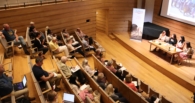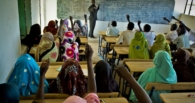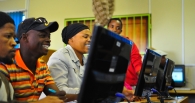Education Cannot Wait – Insights from UKFIET
Christine Fenning
6 November 2017
/
- 0 Comments
Education Cannot Wait (ECW) is a global fund that was launched at the World Humanitarian Summit in 2016 with the aim to transform how education in emergencies and protracted crises is prioritized, resourced, planned and programmed and transitioned into development. No mean feat, especially in the current environment. During 5-7 September 2017 I, along with two colleagues from Mokoro, attended the Education and Development Forum (UKFIET) Conference in Oxford. The conference had been on our horizon for a while, but less than a week before it started Mokoro was engaged to conduct a hosting review of ECW.
Apart from our general interest in education and development, we therefore had a twofold interest in attending the conference: interviewing as many stakeholders as possible in person during those three days, while also learning from the many interesting sessions/workshops. Our time was soon filled with conversations about education in emergencies and protracted crises and gathering views on what the ideal hosting situation of ECW might look like.
This year’s conference focused on Learning and Teaching for Sustainable Development: Curriculum, Cognition and Context and was organised around six sub-themes[1], which were explored in numerous sessions, workshops and discussions.
The conference focused on both the practical and the theoretical, starting at the opening plenary which saw Alice Albright from the Global Partnership for Education (GPE) address the global challenges of achieving SDG4 (“Ensure inclusive and equitable quality education and promote lifelong learning opportunities for all”) and GPE’s approach to strengthening education systems and improving teaching and learning for the world’s most vulnerable children, followed by a talk on the significance of new humanism for education and development by Crain Soudien from the Human Sciences Research Council.
Among the myriad of workshops and sessions that followed, the question of which ones to attend was made easier by the purpose of our team’s presence and my personal experience and interest in conflict-affected states and fragile contexts. I attended sessions focused on strategic issues, e.g. how to properly finance education, how to strengthen literacy interventions in conflict and crisis, and on the search for sustainable education solutions in contexts of protracted displacement.
Then there were the practical examples, such as the presentation on the impact of radio and community mobilisation in contributing to inclusive education in South Sudan, or one about the use of ICT for teaching and learning among Somali refugees in Kenya. It was fascinating to hear about using real-time disaggregated national education data to drive inclusive school enrolment and attendance in fragile and conflict-affected settings, with specific examples from South Sudan, a country which many have given up on and have little hope for. Yet the presentation made clear that even in such a difficult environment it is possible to do good work over a long period of time.
As I continue to reflect on the issue of education in emergencies and protracted crises, a few specific points that were mentioned in many talks across the three days stand out for me:
- Around 75 million school-aged children worldwide are affected by emergency situations
- There is a funding gap of roughly US$8.5 billion a year for education, but
- only about 2% of humanitarian funding goes to education
- Girls are disproportionately affected
None of these points are particularly new, but they are striking nonetheless. I think of the children I personally know in South Sudan, Kenya and Uganda, traumatized by horrendous civil war experiences, yet lucky because they are provided with basic care and an education. But there are many more who are not so fortunate. If one thing stood out from the UKFIET conference, it was that the challenges, the need and the funding gap globally are clear. But what is and can be done about it in a world where one crisis follows another and protracted crises are all too easily forgotten, with the world busy reacting to yet another disaster?
While the right to education was included in the Universal Declaration of Human Rights (1948, Article 26: “Everyone has the right to education”) the right to education in emergencies (EiE) was addressed much more recently with the Resolution on the Right to Education in Emergencies by the UN General Assembly in 2010. In fact, there has been an increased recognition of the importance of EiE since the 2000s. The pace might seem relatively slow but there are indications that it is gaining momentum. Other milestones have included the launch of the Inter-Agency Network on Education in Emergencies (INEE) and its subsequent publications (2004 and 2010) of the handbook of minimum standards on preparedness, response and recovery; the UN Secretary General’s Global Education First Initiative, launched in 2012; the Oslo Summit on Education for Development in 2015; and most recently the Education Cannot Wait Fund, launched at the World Humanitarian Summit in 2016.
At the UKFIET conference it was encouraging to listen to talks about ongoing initiatives that seem to work well, ranging from work with Syrian youth (girls and boys together) in refugee camps in Lebanon to technology-driven work in South Sudan. A number of very positive examples were presented. At the same time there seemed to be general consensus about the lack of evidence to make informed decisions and about poor cooperation, coordination and communication continuing to be big challenges, as well as the fact that funding will remain limited even if new money for EiE is raised, and therefore innovative solutions need to be found.
Education Cannot Wait is one of the bigger initiatives in EiE that has high-level support and in which a large number of stakeholders take an interest. The hosting review focuses specifically on “hosting” of the fund, and that in itself is an interesting and challenging issue. However, it will be even more interesting to see whether in the years to come this relatively new fund will be able to do what it sets out to: partner with stakeholders across the humanitarian and development divide, and together with them ensure that children and youth in emergencies and protracted crises receive an education in addition to shelter and food, as education is key to an individual’s and a society’s development.
The conference’s closing plenary saw Malala Yousafzai and her father Ziauddin Yousafzai speak about their personal experiences, which highlighted very powerfully the importance of education. Their personal testimony also emphasised the fact that everyone can do their part, well known experts and unknown students alike. Many serious global issues and concrete examples had been presented and discussed during those three days, but the conference ended on a hopeful note.
Photo used by David Iliff (License: CC BY-SA 3.0), available on FlickR
[1] The six sub-themes were: Beyond Literacy and Numeracy: rethinking the curriculum; Pedagogies for Sustainable Development; Enabling Teachers; Developing capabilities for sustainable livelihoods; Assessing teaching and learning for sustainable development; Inclusive education for sustainable development.



